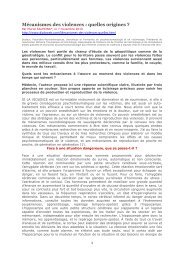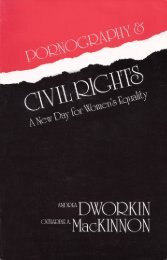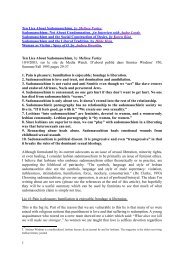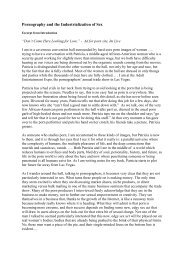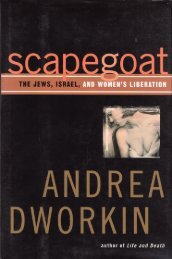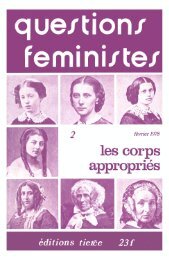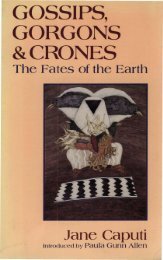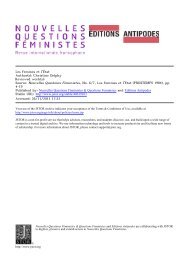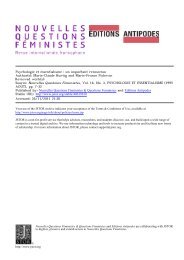Nothing Mat(t)ers: A Feminist Critique of Postmodernism
Nothing Mat(t)ers: A Feminist Critique of Postmodernism
Nothing Mat(t)ers: A Feminist Critique of Postmodernism
Create successful ePaper yourself
Turn your PDF publications into a flip-book with our unique Google optimized e-Paper software.
xxivcharges that political feminism is “essentialist”, Modleski points out: “But surely formany women the phrase ‘women’s experience’ is shorthand for ‘women’sexperience <strong>of</strong> political oppression’, and it is around this experience that they haveorganized and out <strong>of</strong> this experience that they have developed a sense <strong>of</strong> solidarity,commonality and community” (1991, p. 17). Indeed, the writing <strong>of</strong> bell hooks is apr<strong>of</strong>ound examination <strong>of</strong> the obstacles to, but potentials for, female solidarity. It isgrounded in black, female experience. Hooks illuminates race differences and racistprocesses, and reconceptualizes female community and solidarity. She charges thatessentialism is perpetuated by white hetero-patriarchy, while marginalized groupsbeginning from their own standpoint are targeted by an “apolitical” postmodernism.In a review <strong>of</strong> Diana Fuss’s Essentially Speaking, she writes: “Identity politicsemerges out <strong>of</strong> the struggles <strong>of</strong>…exploited groups to have a standpoint on which tocritique dominant structures, a position that gives purpose…to struggle. Criticalpedagogies <strong>of</strong> liberation…necessarily embrace experience, confession and testimonyas relevant ways <strong>of</strong> knowing” (1991a, p. 180). Resisting the notion that race andexperience do not matter, P.Gabrielle Foreman shows that “[r]ace, and the habits <strong>of</strong>surviving we’ve developed to resist its American deployment, is material in a racistculture which so staunchly refuses to admit it is so. This we know but find almosttoo obvious to write down. Yet our silent space is rapidly being filled with postmodern,post-Thurgood Marshall concepts <strong>of</strong> the declining significance <strong>of</strong> race”(1991, p. 13).There is an identity politics to feminist poststructuralism: an identification withthe (white) male text. Elizabeth Meese, for example, writes: “When gender is thefocus for examining difference, deconstructive criticism might even be said to beidentical with the feminist project” (1986, p. xi). Oth<strong>ers</strong> spend time cataloguingfeminism’s convergences with and divergences from this masculine point <strong>of</strong>reference. Alice Jardine (1985) does this in Gynesis, 11 and Hekman (1990) inGender and Knowledge. Some insist that feminism belongs to postmodernism. In“The Discourse <strong>of</strong> Oth<strong>ers</strong>: <strong>Feminist</strong>s and <strong>Postmodernism</strong>,” Craig Owens 12mistakenly tries to improve the status <strong>of</strong> feminism by arguing that it is part <strong>of</strong>postmodernism:The absence <strong>of</strong> discussions <strong>of</strong> sexual difference in writings aboutpostmodernism, as well as the fact that few women have engaged in the10. cont. from previous page many feminists <strong>of</strong> colour and lesbian feminists are complex enough tobe easily misread as both essentialist and deconstructionist by those who reject dialecticalpossibilities… Today, it is not hard to see div<strong>ers</strong>e, heroic and exciting, practice among ever widergroups <strong>of</strong> women who are consciously and collectively claiming the right to define themselves/theiridentity, to speak for themselves, and to name their world; who are articulating their own values andvisions; who are committed to building solidarity/sisterhood as they articulate their differences.Nevertheless, postmodern feminists choose not to see the new dialectical possibilities this practicecreates and reveals. Their theory remains impervious to the lessons as well as the imperatives <strong>of</strong>practice.”11. See Toril Moi (1988) for a critique <strong>of</strong> Jardine’s work as a postfeminism which never really had afeminist stage.12. See Elspeth Probyn’s (1987) critique <strong>of</strong> Craig Owens and Donna Haraway.



